SIT718: Share Price Performance of British Petroleum P.L.C. Analysis
VerifiedAdded on 2023/05/30
|8
|1274
|90
Report
AI Summary
This report analyzes the behavior and performance of British Petroleum P.L.C. (BP) share prices between August and October 2018 using the Geometric Brownian Motion model. The analysis includes calculating drift and diffusion from historical closing prices obtained from Yahoo Finance. The report validates the applicability of the Geometric Brownian Motion by confirming the stability of the market and the duration of the data collected. It compares the calculated drift and diffusion values with information from BP's annual report, finding a favorable comparison for the fiscal year 2017/2018. The report also forecasts the share price for November 16, 2018, comparing it with actual values and discussing the limitations of the model, such as the assumption of a normal distribution and the limited duration of applicability. The study concludes by highlighting the model's usefulness for short-term forecasting but acknowledges its weaknesses related to distributional assumptions and potential for patterned simulated prices. Desklib provides access to similar solved assignments and past papers for students.
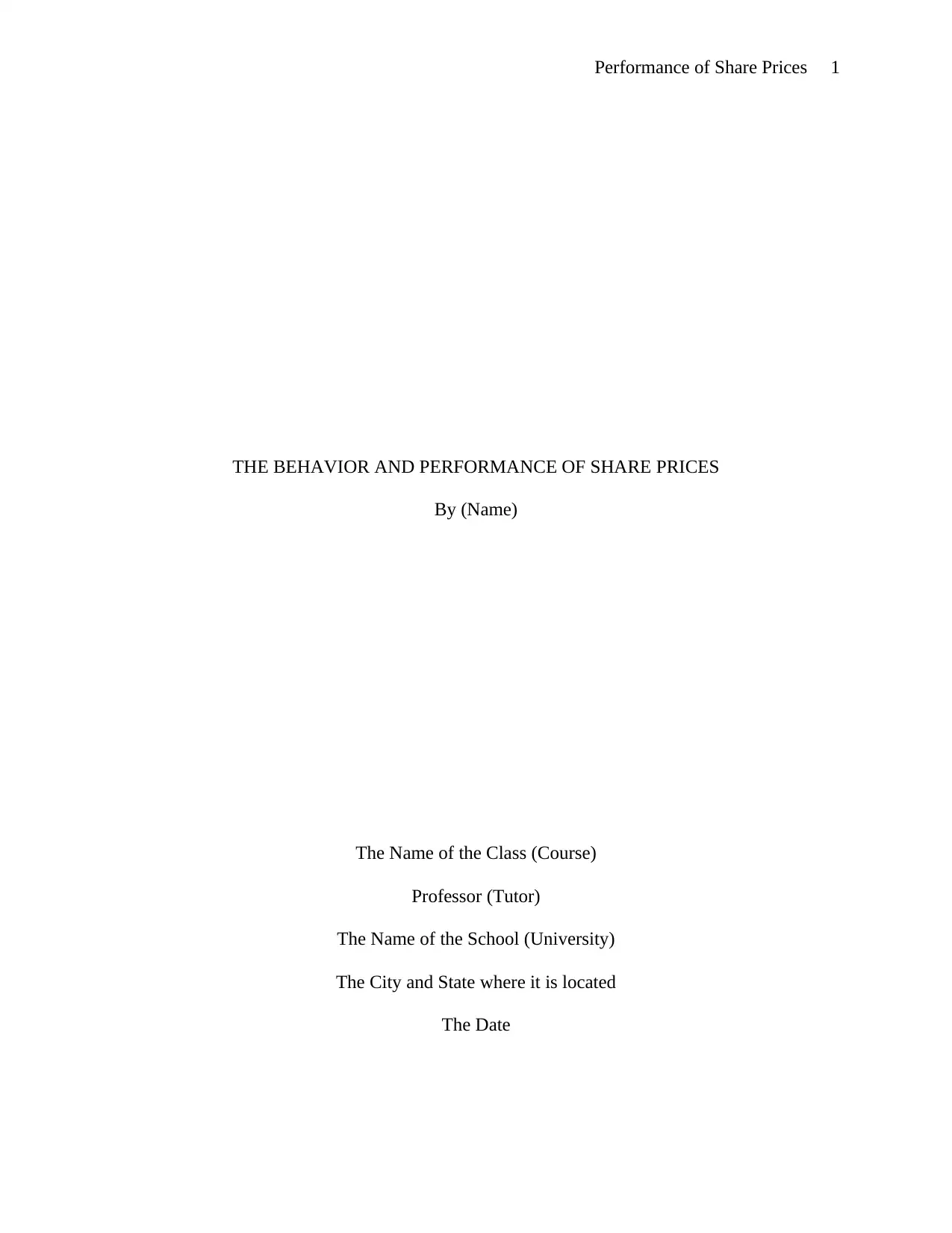
Performance of Share Prices 1
THE BEHAVIOR AND PERFORMANCE OF SHARE PRICES
By (Name)
The Name of the Class (Course)
Professor (Tutor)
The Name of the School (University)
The City and State where it is located
The Date
THE BEHAVIOR AND PERFORMANCE OF SHARE PRICES
By (Name)
The Name of the Class (Course)
Professor (Tutor)
The Name of the School (University)
The City and State where it is located
The Date
Paraphrase This Document
Need a fresh take? Get an instant paraphrase of this document with our AI Paraphraser
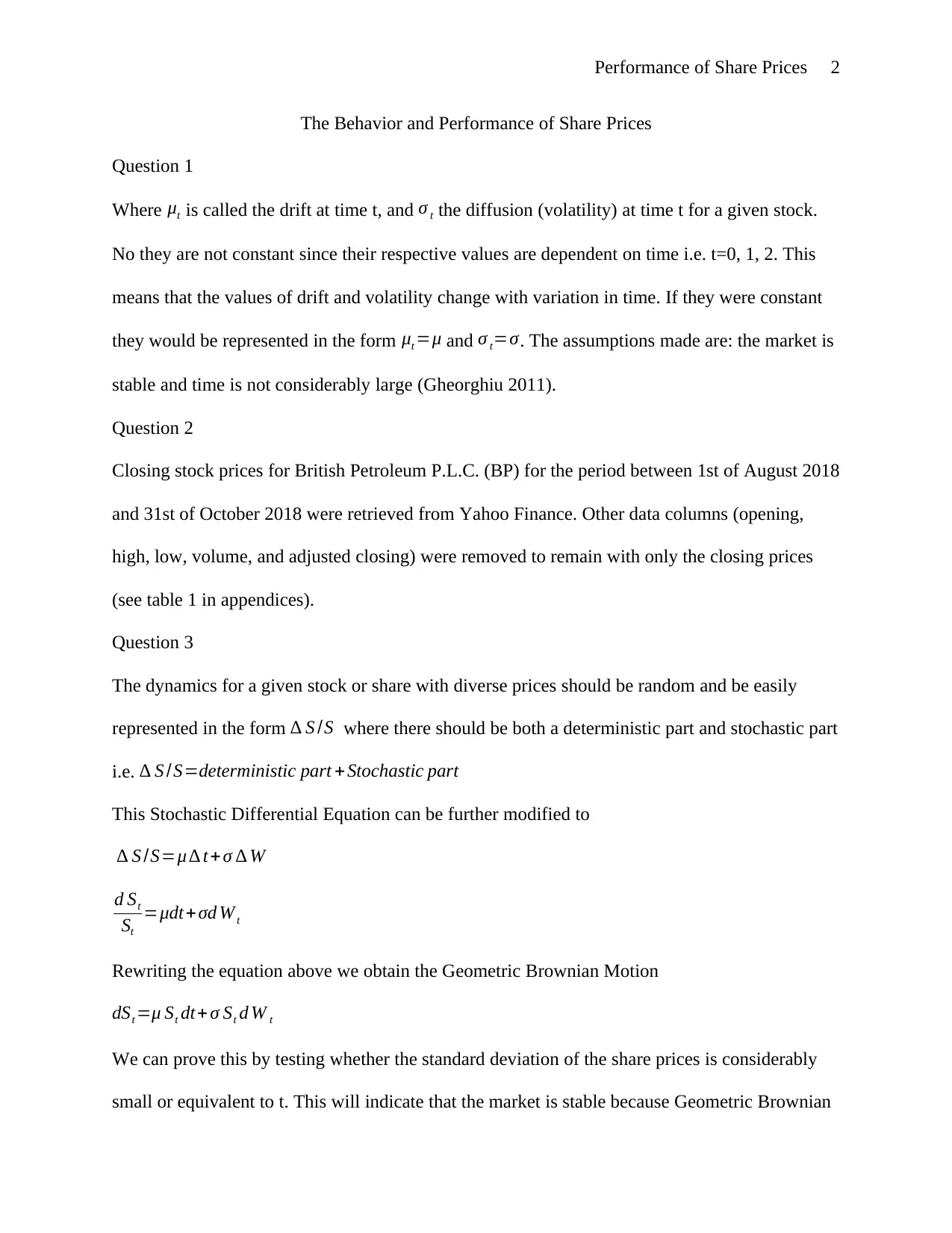
Performance of Share Prices 2
The Behavior and Performance of Share Prices
Question 1
Where μt is called the drift at time t, and σ t the diffusion (volatility) at time t for a given stock.
No they are not constant since their respective values are dependent on time i.e. t=0, 1, 2. This
means that the values of drift and volatility change with variation in time. If they were constant
they would be represented in the form μt =μ and σ t=σ. The assumptions made are: the market is
stable and time is not considerably large (Gheorghiu 2011).
Question 2
Closing stock prices for British Petroleum P.L.C. (BP) for the period between 1st of August 2018
and 31st of October 2018 were retrieved from Yahoo Finance. Other data columns (opening,
high, low, volume, and adjusted closing) were removed to remain with only the closing prices
(see table 1 in appendices).
Question 3
The dynamics for a given stock or share with diverse prices should be random and be easily
represented in the form ∆ S /S where there should be both a deterministic part and stochastic part
i.e. ∆ S /S=deterministic part +Stochastic part
This Stochastic Differential Equation can be further modified to
∆ S /S=μ ∆ t+ σ ∆ W
d St
St
=μdt+σd Wt
Rewriting the equation above we obtain the Geometric Brownian Motion
dSt =μ St dt+ σ St d W t
We can prove this by testing whether the standard deviation of the share prices is considerably
small or equivalent to t. This will indicate that the market is stable because Geometric Brownian
The Behavior and Performance of Share Prices
Question 1
Where μt is called the drift at time t, and σ t the diffusion (volatility) at time t for a given stock.
No they are not constant since their respective values are dependent on time i.e. t=0, 1, 2. This
means that the values of drift and volatility change with variation in time. If they were constant
they would be represented in the form μt =μ and σ t=σ. The assumptions made are: the market is
stable and time is not considerably large (Gheorghiu 2011).
Question 2
Closing stock prices for British Petroleum P.L.C. (BP) for the period between 1st of August 2018
and 31st of October 2018 were retrieved from Yahoo Finance. Other data columns (opening,
high, low, volume, and adjusted closing) were removed to remain with only the closing prices
(see table 1 in appendices).
Question 3
The dynamics for a given stock or share with diverse prices should be random and be easily
represented in the form ∆ S /S where there should be both a deterministic part and stochastic part
i.e. ∆ S /S=deterministic part +Stochastic part
This Stochastic Differential Equation can be further modified to
∆ S /S=μ ∆ t+ σ ∆ W
d St
St
=μdt+σd Wt
Rewriting the equation above we obtain the Geometric Brownian Motion
dSt =μ St dt+ σ St d W t
We can prove this by testing whether the standard deviation of the share prices is considerably
small or equivalent to t. This will indicate that the market is stable because Geometric Brownian
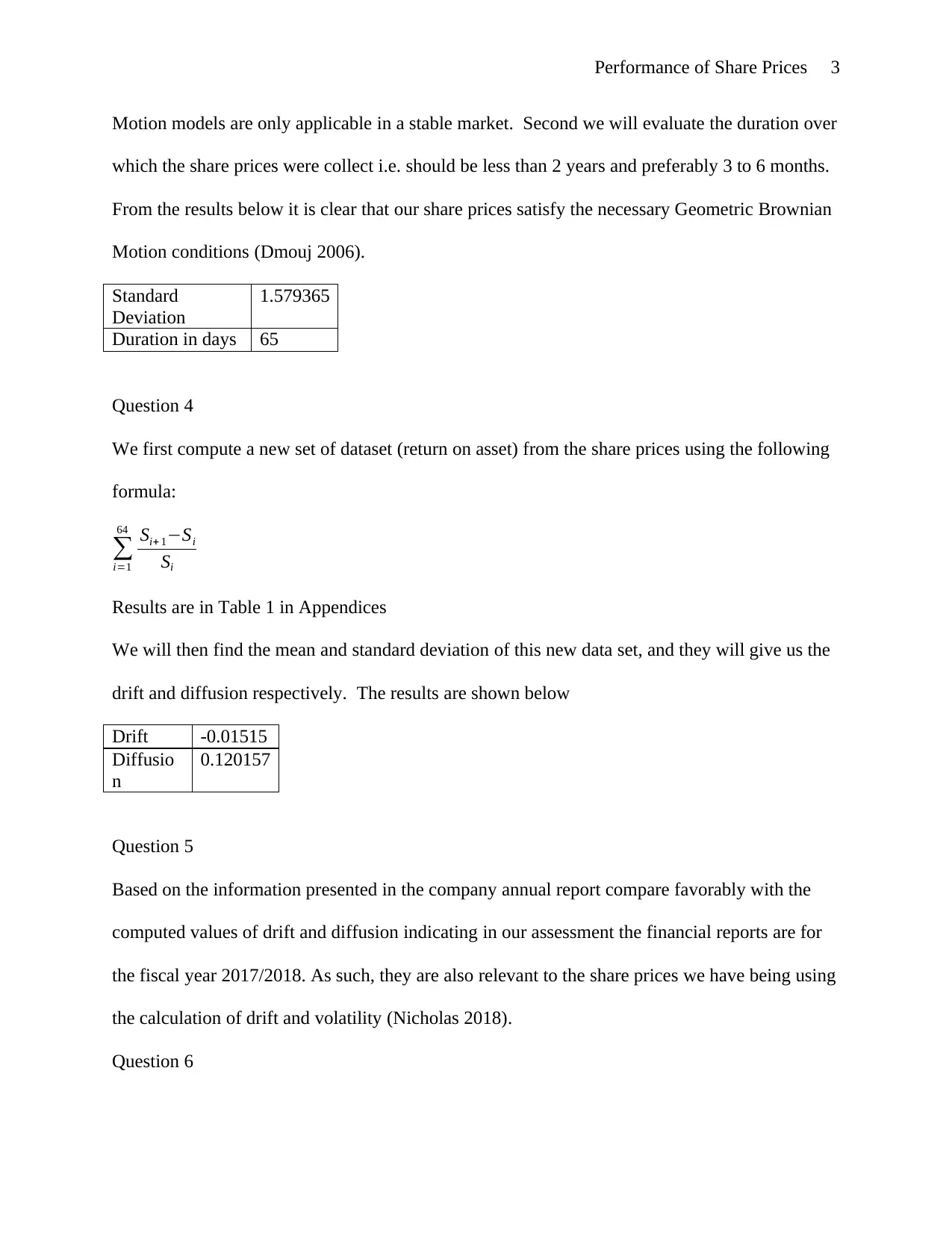
Performance of Share Prices 3
Motion models are only applicable in a stable market. Second we will evaluate the duration over
which the share prices were collect i.e. should be less than 2 years and preferably 3 to 6 months.
From the results below it is clear that our share prices satisfy the necessary Geometric Brownian
Motion conditions (Dmouj 2006).
Standard
Deviation
1.579365
Duration in days 65
Question 4
We first compute a new set of dataset (return on asset) from the share prices using the following
formula:
∑
i=1
64 Si+ 1−Si
Si
Results are in Table 1 in Appendices
We will then find the mean and standard deviation of this new data set, and they will give us the
drift and diffusion respectively. The results are shown below
Drift -0.01515
Diffusio
n
0.120157
Question 5
Based on the information presented in the company annual report compare favorably with the
computed values of drift and diffusion indicating in our assessment the financial reports are for
the fiscal year 2017/2018. As such, they are also relevant to the share prices we have being using
the calculation of drift and volatility (Nicholas 2018).
Question 6
Motion models are only applicable in a stable market. Second we will evaluate the duration over
which the share prices were collect i.e. should be less than 2 years and preferably 3 to 6 months.
From the results below it is clear that our share prices satisfy the necessary Geometric Brownian
Motion conditions (Dmouj 2006).
Standard
Deviation
1.579365
Duration in days 65
Question 4
We first compute a new set of dataset (return on asset) from the share prices using the following
formula:
∑
i=1
64 Si+ 1−Si
Si
Results are in Table 1 in Appendices
We will then find the mean and standard deviation of this new data set, and they will give us the
drift and diffusion respectively. The results are shown below
Drift -0.01515
Diffusio
n
0.120157
Question 5
Based on the information presented in the company annual report compare favorably with the
computed values of drift and diffusion indicating in our assessment the financial reports are for
the fiscal year 2017/2018. As such, they are also relevant to the share prices we have being using
the calculation of drift and volatility (Nicholas 2018).
Question 6
⊘ This is a preview!⊘
Do you want full access?
Subscribe today to unlock all pages.

Trusted by 1+ million students worldwide
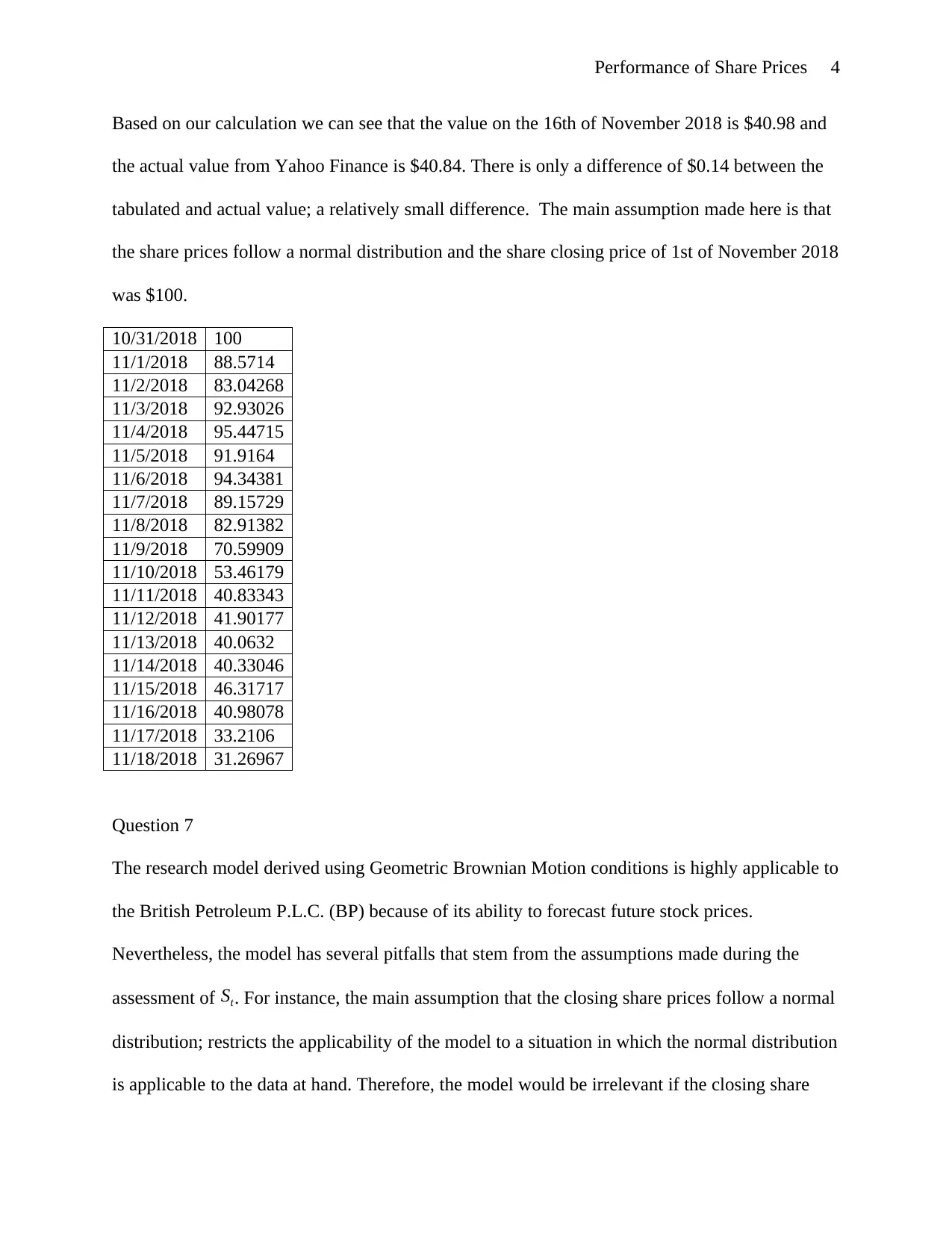
Performance of Share Prices 4
Based on our calculation we can see that the value on the 16th of November 2018 is $40.98 and
the actual value from Yahoo Finance is $40.84. There is only a difference of $0.14 between the
tabulated and actual value; a relatively small difference. The main assumption made here is that
the share prices follow a normal distribution and the share closing price of 1st of November 2018
was $100.
10/31/2018 100
11/1/2018 88.5714
11/2/2018 83.04268
11/3/2018 92.93026
11/4/2018 95.44715
11/5/2018 91.9164
11/6/2018 94.34381
11/7/2018 89.15729
11/8/2018 82.91382
11/9/2018 70.59909
11/10/2018 53.46179
11/11/2018 40.83343
11/12/2018 41.90177
11/13/2018 40.0632
11/14/2018 40.33046
11/15/2018 46.31717
11/16/2018 40.98078
11/17/2018 33.2106
11/18/2018 31.26967
Question 7
The research model derived using Geometric Brownian Motion conditions is highly applicable to
the British Petroleum P.L.C. (BP) because of its ability to forecast future stock prices.
Nevertheless, the model has several pitfalls that stem from the assumptions made during the
assessment of St. For instance, the main assumption that the closing share prices follow a normal
distribution; restricts the applicability of the model to a situation in which the normal distribution
is applicable to the data at hand. Therefore, the model would be irrelevant if the closing share
Based on our calculation we can see that the value on the 16th of November 2018 is $40.98 and
the actual value from Yahoo Finance is $40.84. There is only a difference of $0.14 between the
tabulated and actual value; a relatively small difference. The main assumption made here is that
the share prices follow a normal distribution and the share closing price of 1st of November 2018
was $100.
10/31/2018 100
11/1/2018 88.5714
11/2/2018 83.04268
11/3/2018 92.93026
11/4/2018 95.44715
11/5/2018 91.9164
11/6/2018 94.34381
11/7/2018 89.15729
11/8/2018 82.91382
11/9/2018 70.59909
11/10/2018 53.46179
11/11/2018 40.83343
11/12/2018 41.90177
11/13/2018 40.0632
11/14/2018 40.33046
11/15/2018 46.31717
11/16/2018 40.98078
11/17/2018 33.2106
11/18/2018 31.26967
Question 7
The research model derived using Geometric Brownian Motion conditions is highly applicable to
the British Petroleum P.L.C. (BP) because of its ability to forecast future stock prices.
Nevertheless, the model has several pitfalls that stem from the assumptions made during the
assessment of St. For instance, the main assumption that the closing share prices follow a normal
distribution; restricts the applicability of the model to a situation in which the normal distribution
is applicable to the data at hand. Therefore, the model would be irrelevant if the closing share
Paraphrase This Document
Need a fresh take? Get an instant paraphrase of this document with our AI Paraphraser

Performance of Share Prices 5
prices follow a Poisson or uniform distribution. The second assumption is that the closing share
price on the 1st of November 2018 for BP would be $100; Grated the figure is random, but it is
highly unrealistic given that such a high value has not been realized in the past 3 months. In
reality, a good naive prediction for the closing share price on the 1/11/2018 would be a value in
the interval (42,44). Another restriction arises from the duration applicability of the model; this
means the model cannot be considered reliable beyond a given date; most notably >25 days.
Therefore, our model can only be used to forecast closing share prices for the next one month.
Using the model to predict BP closing share prices will result in the tabulation of considerably
low figures e.g. $23 closing share price on 7/12/208. The last weakness associated with the
model is fact that simulated closing share prices will take-on a pattern.
prices follow a Poisson or uniform distribution. The second assumption is that the closing share
price on the 1st of November 2018 for BP would be $100; Grated the figure is random, but it is
highly unrealistic given that such a high value has not been realized in the past 3 months. In
reality, a good naive prediction for the closing share price on the 1/11/2018 would be a value in
the interval (42,44). Another restriction arises from the duration applicability of the model; this
means the model cannot be considered reliable beyond a given date; most notably >25 days.
Therefore, our model can only be used to forecast closing share prices for the next one month.
Using the model to predict BP closing share prices will result in the tabulation of considerably
low figures e.g. $23 closing share price on 7/12/208. The last weakness associated with the
model is fact that simulated closing share prices will take-on a pattern.
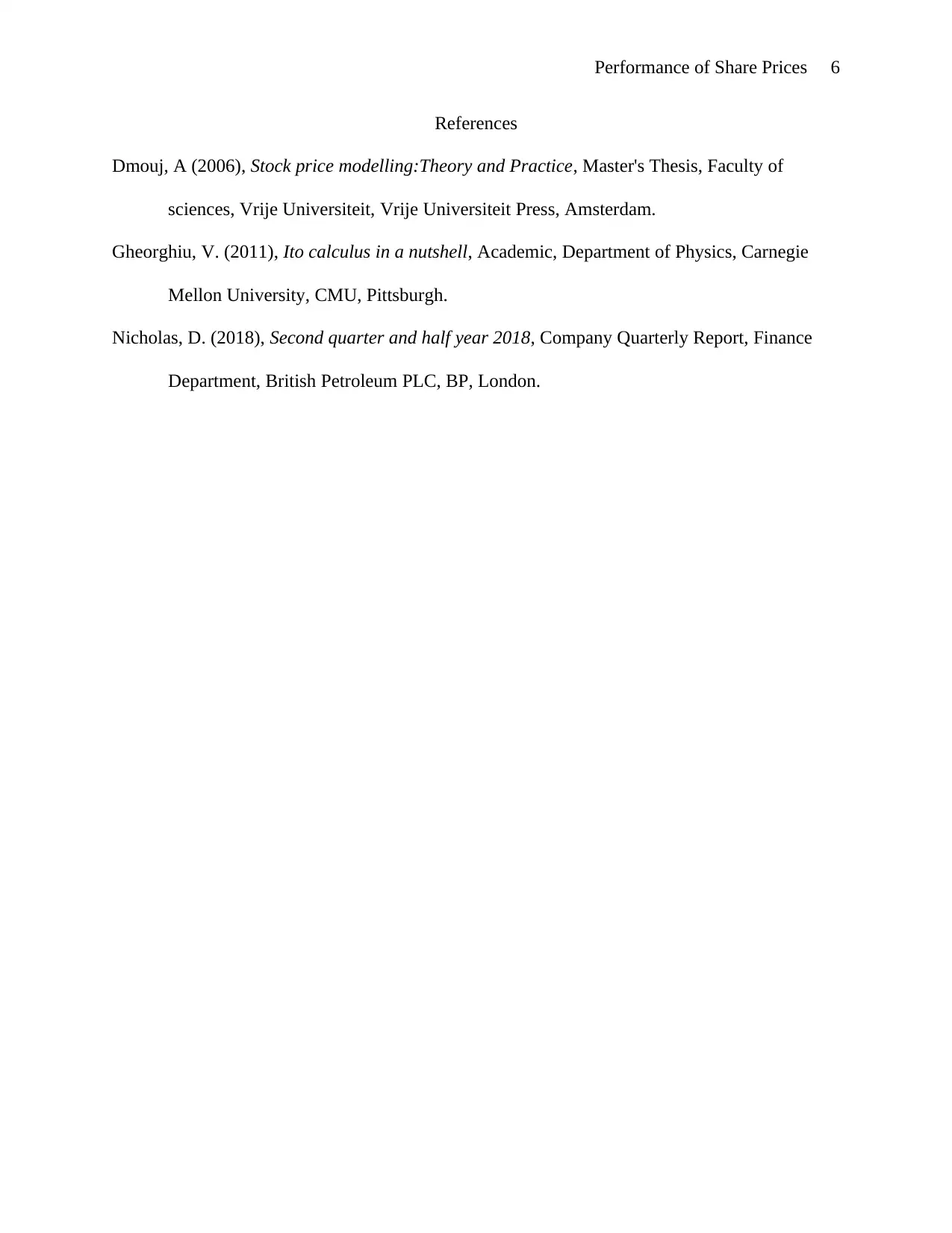
Performance of Share Prices 6
References
Dmouj, A (2006), Stock price modelling:Theory and Practice, Master's Thesis, Faculty of
sciences, Vrije Universiteit, Vrije Universiteit Press, Amsterdam.
Gheorghiu, V. (2011), Ito calculus in a nutshell, Academic, Department of Physics, Carnegie
Mellon University, CMU, Pittsburgh.
Nicholas, D. (2018), Second quarter and half year 2018, Company Quarterly Report, Finance
Department, British Petroleum PLC, BP, London.
References
Dmouj, A (2006), Stock price modelling:Theory and Practice, Master's Thesis, Faculty of
sciences, Vrije Universiteit, Vrije Universiteit Press, Amsterdam.
Gheorghiu, V. (2011), Ito calculus in a nutshell, Academic, Department of Physics, Carnegie
Mellon University, CMU, Pittsburgh.
Nicholas, D. (2018), Second quarter and half year 2018, Company Quarterly Report, Finance
Department, British Petroleum PLC, BP, London.
⊘ This is a preview!⊘
Do you want full access?
Subscribe today to unlock all pages.

Trusted by 1+ million students worldwide
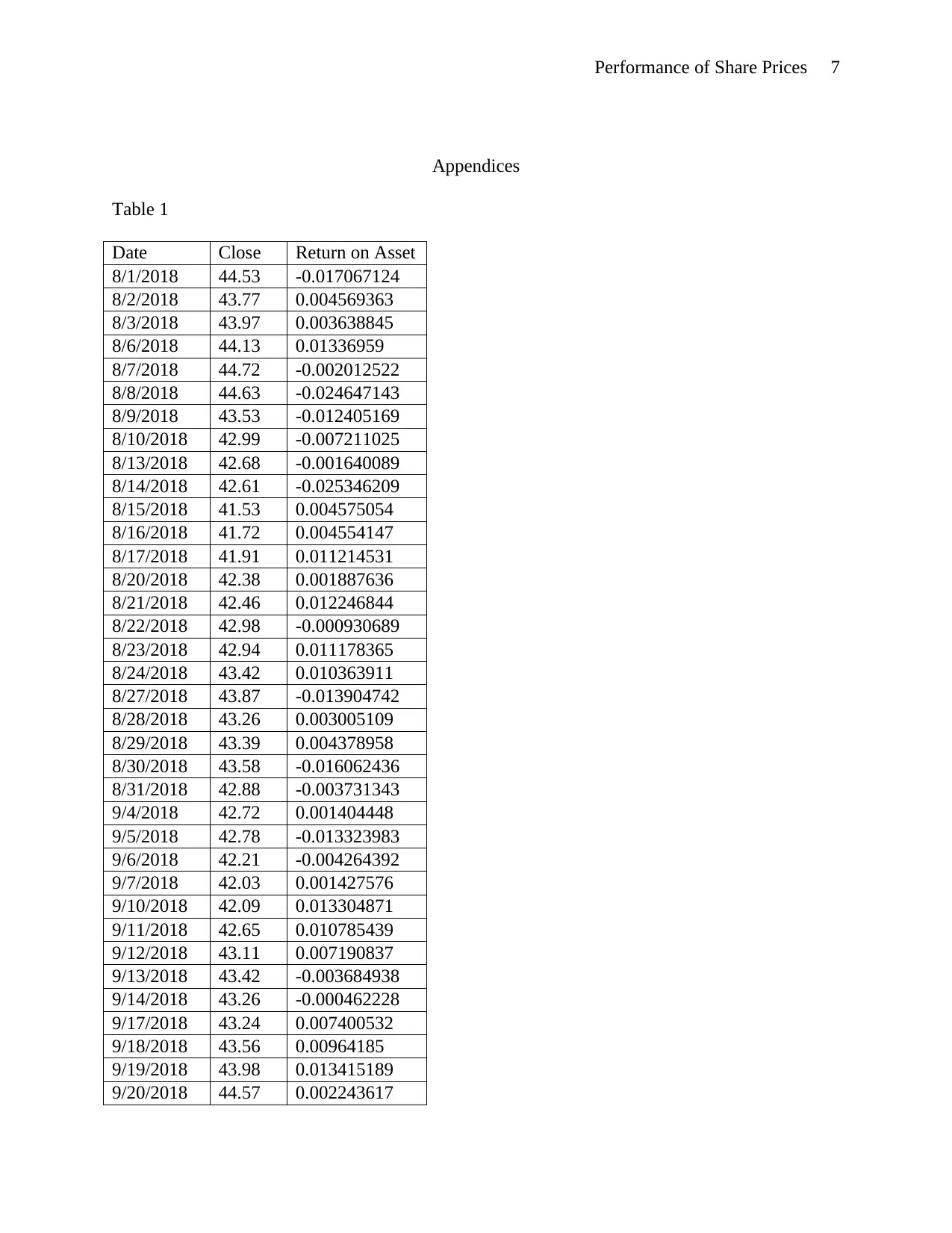
Performance of Share Prices 7
Appendices
Table 1
Date Close Return on Asset
8/1/2018 44.53 -0.017067124
8/2/2018 43.77 0.004569363
8/3/2018 43.97 0.003638845
8/6/2018 44.13 0.01336959
8/7/2018 44.72 -0.002012522
8/8/2018 44.63 -0.024647143
8/9/2018 43.53 -0.012405169
8/10/2018 42.99 -0.007211025
8/13/2018 42.68 -0.001640089
8/14/2018 42.61 -0.025346209
8/15/2018 41.53 0.004575054
8/16/2018 41.72 0.004554147
8/17/2018 41.91 0.011214531
8/20/2018 42.38 0.001887636
8/21/2018 42.46 0.012246844
8/22/2018 42.98 -0.000930689
8/23/2018 42.94 0.011178365
8/24/2018 43.42 0.010363911
8/27/2018 43.87 -0.013904742
8/28/2018 43.26 0.003005109
8/29/2018 43.39 0.004378958
8/30/2018 43.58 -0.016062436
8/31/2018 42.88 -0.003731343
9/4/2018 42.72 0.001404448
9/5/2018 42.78 -0.013323983
9/6/2018 42.21 -0.004264392
9/7/2018 42.03 0.001427576
9/10/2018 42.09 0.013304871
9/11/2018 42.65 0.010785439
9/12/2018 43.11 0.007190837
9/13/2018 43.42 -0.003684938
9/14/2018 43.26 -0.000462228
9/17/2018 43.24 0.007400532
9/18/2018 43.56 0.00964185
9/19/2018 43.98 0.013415189
9/20/2018 44.57 0.002243617
Appendices
Table 1
Date Close Return on Asset
8/1/2018 44.53 -0.017067124
8/2/2018 43.77 0.004569363
8/3/2018 43.97 0.003638845
8/6/2018 44.13 0.01336959
8/7/2018 44.72 -0.002012522
8/8/2018 44.63 -0.024647143
8/9/2018 43.53 -0.012405169
8/10/2018 42.99 -0.007211025
8/13/2018 42.68 -0.001640089
8/14/2018 42.61 -0.025346209
8/15/2018 41.53 0.004575054
8/16/2018 41.72 0.004554147
8/17/2018 41.91 0.011214531
8/20/2018 42.38 0.001887636
8/21/2018 42.46 0.012246844
8/22/2018 42.98 -0.000930689
8/23/2018 42.94 0.011178365
8/24/2018 43.42 0.010363911
8/27/2018 43.87 -0.013904742
8/28/2018 43.26 0.003005109
8/29/2018 43.39 0.004378958
8/30/2018 43.58 -0.016062436
8/31/2018 42.88 -0.003731343
9/4/2018 42.72 0.001404448
9/5/2018 42.78 -0.013323983
9/6/2018 42.21 -0.004264392
9/7/2018 42.03 0.001427576
9/10/2018 42.09 0.013304871
9/11/2018 42.65 0.010785439
9/12/2018 43.11 0.007190837
9/13/2018 43.42 -0.003684938
9/14/2018 43.26 -0.000462228
9/17/2018 43.24 0.007400532
9/18/2018 43.56 0.00964185
9/19/2018 43.98 0.013415189
9/20/2018 44.57 0.002243617
Paraphrase This Document
Need a fresh take? Get an instant paraphrase of this document with our AI Paraphraser
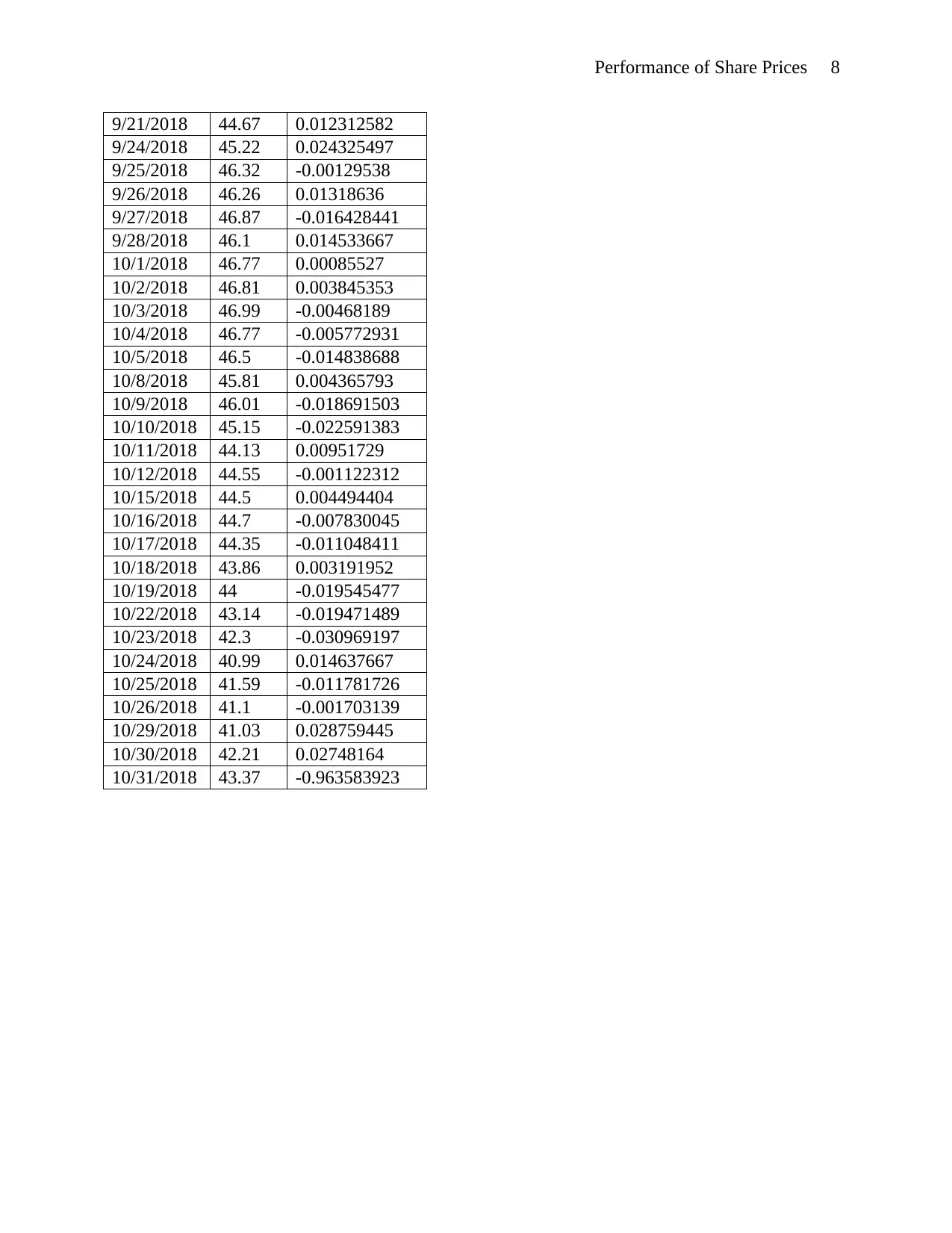
Performance of Share Prices 8
9/21/2018 44.67 0.012312582
9/24/2018 45.22 0.024325497
9/25/2018 46.32 -0.00129538
9/26/2018 46.26 0.01318636
9/27/2018 46.87 -0.016428441
9/28/2018 46.1 0.014533667
10/1/2018 46.77 0.00085527
10/2/2018 46.81 0.003845353
10/3/2018 46.99 -0.00468189
10/4/2018 46.77 -0.005772931
10/5/2018 46.5 -0.014838688
10/8/2018 45.81 0.004365793
10/9/2018 46.01 -0.018691503
10/10/2018 45.15 -0.022591383
10/11/2018 44.13 0.00951729
10/12/2018 44.55 -0.001122312
10/15/2018 44.5 0.004494404
10/16/2018 44.7 -0.007830045
10/17/2018 44.35 -0.011048411
10/18/2018 43.86 0.003191952
10/19/2018 44 -0.019545477
10/22/2018 43.14 -0.019471489
10/23/2018 42.3 -0.030969197
10/24/2018 40.99 0.014637667
10/25/2018 41.59 -0.011781726
10/26/2018 41.1 -0.001703139
10/29/2018 41.03 0.028759445
10/30/2018 42.21 0.02748164
10/31/2018 43.37 -0.963583923
9/21/2018 44.67 0.012312582
9/24/2018 45.22 0.024325497
9/25/2018 46.32 -0.00129538
9/26/2018 46.26 0.01318636
9/27/2018 46.87 -0.016428441
9/28/2018 46.1 0.014533667
10/1/2018 46.77 0.00085527
10/2/2018 46.81 0.003845353
10/3/2018 46.99 -0.00468189
10/4/2018 46.77 -0.005772931
10/5/2018 46.5 -0.014838688
10/8/2018 45.81 0.004365793
10/9/2018 46.01 -0.018691503
10/10/2018 45.15 -0.022591383
10/11/2018 44.13 0.00951729
10/12/2018 44.55 -0.001122312
10/15/2018 44.5 0.004494404
10/16/2018 44.7 -0.007830045
10/17/2018 44.35 -0.011048411
10/18/2018 43.86 0.003191952
10/19/2018 44 -0.019545477
10/22/2018 43.14 -0.019471489
10/23/2018 42.3 -0.030969197
10/24/2018 40.99 0.014637667
10/25/2018 41.59 -0.011781726
10/26/2018 41.1 -0.001703139
10/29/2018 41.03 0.028759445
10/30/2018 42.21 0.02748164
10/31/2018 43.37 -0.963583923
1 out of 8
Related Documents
Your All-in-One AI-Powered Toolkit for Academic Success.
+13062052269
info@desklib.com
Available 24*7 on WhatsApp / Email
![[object Object]](/_next/static/media/star-bottom.7253800d.svg)
Unlock your academic potential
Copyright © 2020–2026 A2Z Services. All Rights Reserved. Developed and managed by ZUCOL.





